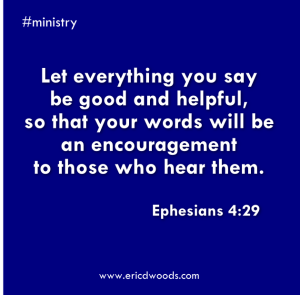 I came down off the stage feeling great about the training I had just led with our 600ish summer staff. It was a topic I’m passionate about: providing amazing customer service.
I came down off the stage feeling great about the training I had just led with our 600ish summer staff. It was a topic I’m passionate about: providing amazing customer service.
I did everything right. I smiled. I taught without notes. I had great visuals. I brought volunteers up on stage to help me illustrate my key points. I was funny.
So, when one of the staff who had been in the room approached me immediately afterwards and asked me who had written the training, I was feeling pretty good about myself. I had written it. She must want to know what book it came from, I was thinking. It would make a good book…
But that’s not what she said. “Why did you use the word lame?” she asked, not smiling at me. “I am a coordinator for our campers with special needs and we’re trying really hard to teach the staff not to use words like that.”
She was right. We do train our staff to be careful about their speech. Words like I used that day, which we often use without thinking, are rooted in disabilities. When we use them to describe something or someone negatively, it also reflects negatively on people who have that disability.
I tried to backtrack quickly, but I couldn’t justify my use of the word. For this young staff person, and maybe others in the room that day, this is what she would remember from my message. All the important things I had taught about customer service were suddenly lost to this one word.
It’s a hard lesson to learn, and I have learned it more than once. So here are five things that you can do to avoid spoiling a great message with a single unfortunate word.
Get in the habit of using person-first speech.
This is a monumental shift for many people. Here’s how it works: simply begin from the premise that all people are people first. Then describe them, but only if it’s relevant.
So, instead of saying short people, fat people, or disabled people, just say people. If it matters how tall they are or how much they weigh or if they have a disability, then say it person-first. Instead of saying, “That makes it hard for short people,” say, “That make it harder for people who are shorter.” It works because these things don’t define them, even if they do correctly describe them.
Always practice your public speaking out loud before you say it in front of a crowd.
You will often hear things differently when you say them out loud than when you write them or type them. If you have the time and ability, record yourself practicing and play it back. You will catch even more potential problems this way.
Avoid ethnic accents.
More than once I’ve heard a preacher or speaker ruin a great message because he tried to throw in an accent to add character to a story. It’s very difficult to portray an ethnic accent in a way that’s not offensive to at least some.
Know your audience.
There are likely things you could get away with saying in some crowds but not others. For instance, I wouldn’t make a joke about farting in a Sunday service at a church… but it would be really hard to share an effective message with a group of middle school students without at least one reference to flatulence.
So, before you walk out on stage, be sure you’ve got a pretty good idea about who you’re speaking to, what is on their minds that day, and any topics you should avoid. You can often learn much of this information by asking your host, or a few people you connect well with in the lobby before you get up to speak.
Only say it if you planned to say it and if it adds to your message.
Most of the things I have said from stage that I regret were unplanned. They were things I adlibbed, or added off the cuff. These are usually the problem areas because they have skipped at least a couple of the filters above. I didn’t consider the language I was using, practice this part out loud, or consider what I was saying in relation to my audience.
The truth is, anything you say that doesn’t support your message or add something to it, will likely just distract from what you are trying to say.
What have you said from stage you wish you could take back?
I learned at SpringHill that people are people first. When working with or talking about anybody, but it was emphasized when working with campers with Special Needs. They were Special Needs Campers, because that puts emphasis on the disability. That was one big thing that stuck with me from my counseling experience there!
Kassie, an important lesson to learn… and a great place to learn it. For many of our campers with special needs, it’s a week when they can forget about their special needs and just be kids.
Good post!